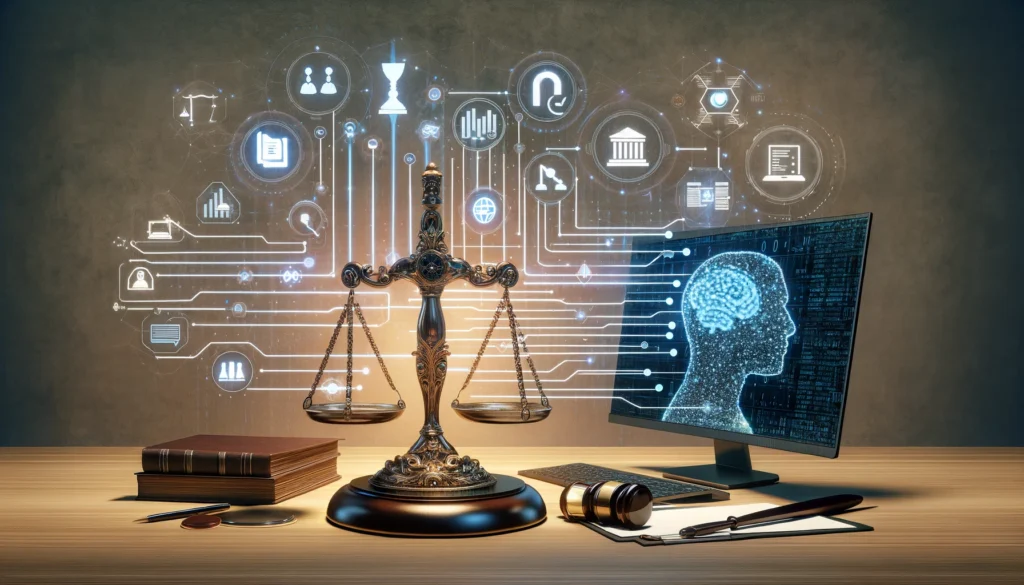
Introduction
Imagine sifting through countless contracts, each filled with dense legal jargon, searching for that one crucial clause that could make or break a case. As a paralegal, this time-consuming task is just one of the many challenges you face in the high-stakes world of corporate law. But what if there was a way to streamline this process, to make contract review not just faster, but more accurate and efficient?
Enter ChatGPT, a powerful language model that’s transforming the way professionals across industries interact with and interpret text. In the realm of corporate law, ChatGPT holds immense potential for optimizing contract review processes, offering paralegals a valuable tool to navigate the complexities of their day-to-day work.
This article will delve into the practical applications of ChatGPT in contract review, providing paralegals with creative and nuanced prompts and techniques to leverage this technology. We’ll explore how ChatGPT can help speed up contract review, improve accuracy, and ultimately, revolutionize your workflow.
Next, we’ll introduce ChatGPT and its capabilities, setting the stage for a deeper exploration of its potential in corporate law.
Understanding ChatGPT and its Capabilities
Before we dive into the practical applications of ChatGPT in contract review, it’s crucial to understand what this technology is and what it can do. At its core, ChatGPT is a sophisticated language model developed by OpenAI. It’s designed to understand and generate human-like text based on the input it receives, making it a powerful tool for a wide range of applications, from drafting emails to analyzing complex documents.
In the context of corporate law, ChatGPT’s capabilities are particularly promising. It can read and interpret legal text, identify key terms and clauses, and even summarize lengthy documents. This makes it an invaluable tool for paralegals, who often spend hours poring over contracts, searching for specific information.
But how can you prepare your contracts for review by ChatGPT? In the next section, we’ll explore some techniques for converting your contracts into a format suitable for ChatGPT, setting the stage for a more efficient and effective contract review process.
Preparing Contracts for Review with ChatGPT
To leverage ChatGPT effectively for contract review, it’s essential to prepare your contracts in a way that allows the model to read and interpret them accurately. Here are some techniques to help you do just that:
- Convert Contracts to Text Format: ChatGPT works best with plain text. If your contracts are in PDF format, use a reliable tool to convert them into a text file.
- Ensure Clear and Concise Input: The clearer and more concise your input, the better ChatGPT can interpret it. Remove any unnecessary formatting, such as tables or images, and break down complex sentences into simpler ones.
- Organize Your Contracts: If you’re reviewing multiple contracts, organize them in a logical order. This will help ChatGPT identify patterns and similarities between contracts more effectively.
With your contracts prepared for review, the next step is to leverage ChatGPT for the initial contract review. In the following section, we’ll discuss how to use ChatGPT to identify key clauses and terms, summarize contract content, and compare contracts.
Leveraging ChatGPT for Initial Contract Review
ChatGPT can significantly streamline the initial contract review process, helping paralegals identify key clauses and terms, summarize contract content, and compare contracts. Here are some techniques and prompt variations to guide you:
- Identifying Key Clauses and Terms: Ask ChatGPT to identify specific clauses or terms in a contract. For example:
- “Find all instances of the term ‘indemnification’ in this contract.”
- “Identify the clause related to dispute resolution in this contract.”
- Summarizing Contract Content: ChatGPT can provide a brief summary of a contract or a specific section. Here are some prompts to use:
- “Provide a summary of this contract.”
- “Summarize the key points in the ‘Termination’ section of this contract.”
- Comparing Contracts: ChatGPT can help identify discrepancies between contracts. Use prompts like:
- “Compare the ‘Confidentiality’ clauses in Contract A and Contract B.”
- “Highlight any differences between the ‘Payment Terms’ in these two contracts.”
By leveraging ChatGPT for initial contract review, paralegals can save valuable time and focus on more complex tasks. In the next section, we’ll explore some advanced techniques for contract analysis with ChatGPT.
Advanced Techniques for Contract Analysis with ChatGPT
Beyond initial contract review, ChatGPT can be used for more in-depth contract analysis. Here are some advanced techniques and corresponding prompt variations:
- Analyzing Contract Language: ChatGPT can help identify ambiguities and potential risks in contract language. Here are some prompts to use:
- “Identify any ambiguous language in this contract that could lead to potential disputes.”
- “Are there any clauses in this contract that could pose a risk to our client?”
- Suggesting Alternative Clauses: ChatGPT can suggest alternative clauses or language to improve contract drafting. Try these prompts:
- “Suggest a more concise way to word this clause.”
- “Propose an alternative to this clause that better protects our client’s interests.”
- Predicting Potential Issues: ChatGPT can predict potential issues based on the contract language. Here are some prompts:
- “What potential issues could arise from the ‘Termination’ clause in this contract?”
- “Are there any clauses in this contract that might conflict with our client’s business operations?”
By employing these advanced techniques, paralegals can use ChatGPT not just for contract review, but also for contract drafting and negotiation. In the next section, we’ll discuss how to integrate ChatGPT into your daily workflow for optimal results.
Integrating ChatGPT into Your Daily Workflow
Integrating ChatGPT into your daily workflow can significantly enhance your efficiency and productivity. Here are some practical tips to help you get started:
- Start Small: Begin by using ChatGPT for simple tasks, like identifying key clauses or summarizing contract content. As you become more comfortable with the tool, you can start using it for more complex tasks.
- Create a Cheat Sheet of Prompts: Keep a list of prompts that work well for different tasks. This will save you time and help you use ChatGPT more effectively.
- Collaborate with Your Team: Share your experiences and tips with your colleagues. Their feedback can help you improve your use of ChatGPT and vice versa.
- Continuous Learning: Stay updated with the latest features and improvements in ChatGPT. This will help you leverage the tool to its fullest potential.
By integrating ChatGPT into your daily workflow, you can revolutionize your approach to contract review and analysis. In the next section, we’ll discuss some ethical considerations and limitations of using ChatGPT in contract review.
Ethical Considerations and Limitations of ChatGPT in Contract Review
While ChatGPT offers numerous benefits, it’s important to consider the ethical implications and limitations of using AI in contract review.
- Reliance on AI: While ChatGPT can assist in contract review, it should not replace human judgment. Always review and verify the information provided by ChatGPT.
- Confidentiality: Ensure that the use of ChatGPT does not compromise the confidentiality of your contracts. Always use secure platforms and follow your firm’s data protection policies.
- Accuracy: Remember that while ChatGPT is highly accurate, it’s not infallible. It may occasionally misinterpret or overlook information.
- Legal Responsibility: The ultimate legal responsibility for contract review lies with the human professional, not the AI tool.
By understanding these ethical considerations and limitations, you can use ChatGPT responsibly and effectively.
Conclusion
The future of AI in corporate law is promising. As tools like ChatGPT continue to evolve, we can expect them to become even more sophisticated and integrated into daily legal tasks. This could lead to more efficient workflows, improved accuracy, and a greater focus on strategic, high-level tasks for paralegals.
In conclusion, embracing AI tools like ChatGPT can significantly enhance the contract review process, making it faster, more accurate, and more efficient. While there are ethical considerations and limitations to consider, the benefits are clear. As we look to the future, the integration of AI in corporate law is set to become not just an option, but a necessity. By learning to leverage these tools effectively, paralegals can stay ahead of the curve and revolutionize their approach to contract review.


